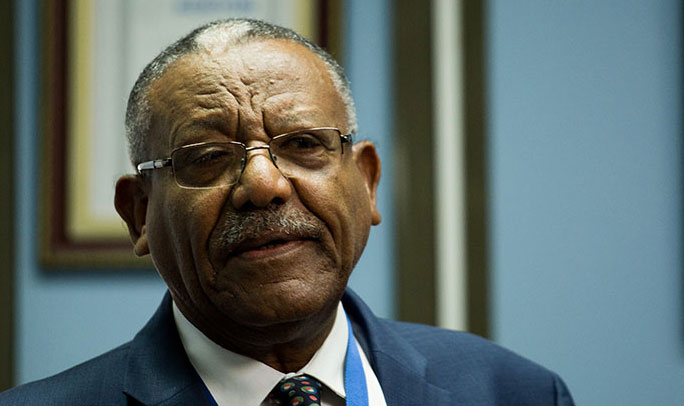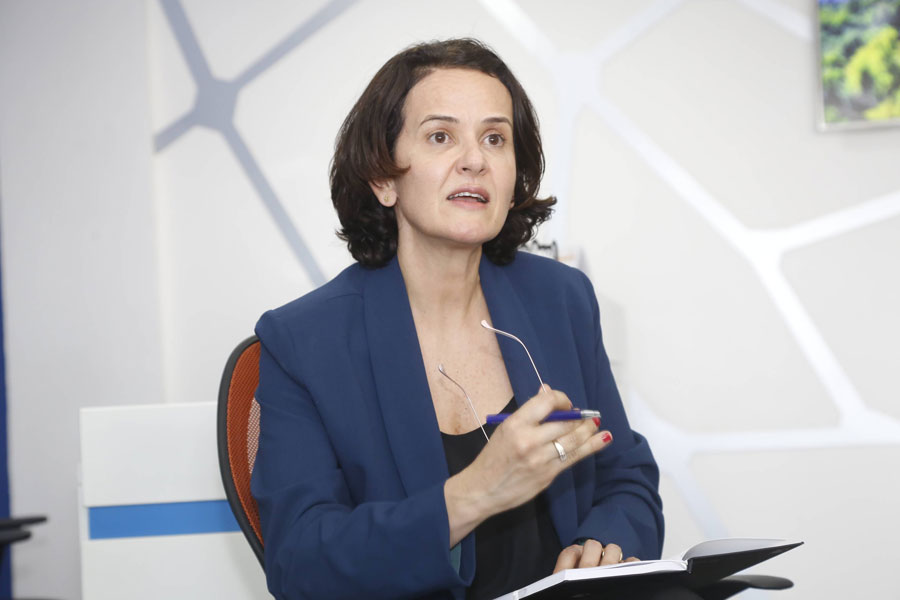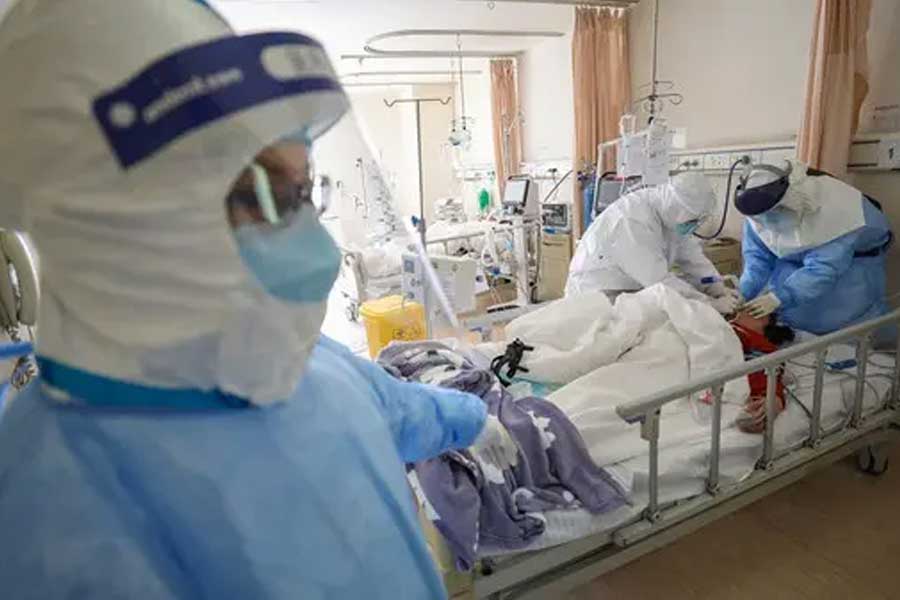
Fortune News | Jun 29,2019
On the afternoon of December 3, 2019, Sumeya Menegistu, a 22-year-old student, was sitting alone outside of a classroom in the large compound at St. Mary’s University, which is located in Mexico, waiting for the bell to ring.
Dropping out from public university, she is astonished by the different atmosphere the private college offers, where everybody sits together discussing different topics freely.
Sumeya began her journey to become a medical doctor when she was placed in Meqelle University's Department of Anaesthesia.
But her dream did not come true because of the unrest that occurred in different public universities, and she chose to drop out of the University after discussing the matter with her family.
“The University was relatively peaceful, but rumours from other universities and my family’s concerns pushed me to drop out,” she said. “Now I am not studying the subject that I want to."
Sumeya, who is currently enrolled in the accounting department, was not the only one whose dreams were crushed.
Exodus Tarkegn, a young woman in her mid-20s, was also placed at Ambo University in the Mechanical Engineering Department. However, she refused to go, because she was concerned about her safety.
A third child to her family, Exodus paid 3,500 Br to register at St. Mary’s University to study accounting.
“I want to study mechanical engineering, but I can’t,” Exodus said.
As a result of unrest and disputes in different universities in the country, which began a few years ago but roared back to prominence this year, parents who can afford to pay tuition fees are sending their children to private colleges.
The fear from families and students, which is leading to dropouts, prompted the number of private higher education facilities to double to 238 this year. Five years ago, the number of private colleges and universities stood at 106.
So far, 587,729 students have graduated from these private higher educational institutions, while close to 371,071 students are currently studying at these institutions.
Liqet College, which secured a license from the Higher Education Relevance & Quality Agency (HERQA) this year to open a college in the capital city near the Ministry of Education, is one of them that has taken advantage of the unease on public campuses.
It took four months for the College to receive a license from the Agency, a government body that is responsible for regulating private higher education institutions.
Edvac College is one of the private higher education institutions that got a license this year to operate in Meqelle, Tigray Regional State.
Before granting a new license for the colleges, the Agency makes sure that the applicants offer suitable buildings for education, a library, curriculum textbooks and professors or lecturers with proper credentials. The licensing process can take one to three months.
Liqet so far has registered 50 students under two programmes, accounting & finance and management, according to Mulugeta Mohammed, head of Liqet, which plans to start classes this coming week.
“The demands of students enrolling in private colleges have increased considerably," said Mulugeta. "We are planning to start processing licenses to give more courses."
The increase of private higher education institutions is not only limited to the capital city but also is taking place in regional cities.
Edvac College is one of the private institutions that got a license to operate in Meqelle, Tigray Regional State. The College secured a license to give out two courses, accounting & finance and management.
For the current academic year, Edvac enrolled 100 students. The management of the College also plans to expand its campuses to two more locations.
"We're also planning to open campuses in Maichew and Raya," said Filimon Laek, head of Edvac. "The demand is high, especially after last year."
Andualem Admassie (PhD), the director-general of HERQA, agrees with Filimon that private educational institutions have experienced an uptick in admissions since last year.
Though unrest at public universities and higher education institutions have been observed since 2015, in tandem with massive protests across Oromia and Amhara regional states, it has increased in volume more recently.
Ethiopia has 50 public universities, and there were 873,000 students studying for their first degrees in these universities during the 2018/19 academic year. For this fiscal year, the country allocated 50.6 billion Br, 13pc of its total budget, for education.
There are also 38 teachers’ education colleges throughout the country that provide a three-year diploma in teaching through regular, summer and extension programmes.
Last year, over a quarter of a million senior high school students sat for national exams, and 213,621 of them were qualified to join higher educational institutions. The government assigns students to various universities, and at least two-thirds attend the schools that they are placed in.
During the latest violence at public universities, many students died. The unrest that started on November 9, 2019, occurred at Oda Bultum, Debra Birhan, Madda Walabu, Ambo, Wellega, Dambi Dollo, Woldia, Wello, Debre Tabor, Metu, Jinka, Werabe, Debark and Dire Dawa Universities.
The instances of unrest reportedly claimed the lives of six students. Most of the universities also temporally ceased classes for days until the campus atmosphere became calm and returned to normal.
Students sit outside of a classroom and talk in the large compound at St. Mary’s University, which is located in the Mexico neighborhood.
"Since unrest in some universities continue, especially first-year students will shift to private institutions," said Dechasa Gurmu, communications director at the Ministry of Science & Higher Education.
The situation reached a critical stage before Prime Minister Abiy Ahmed (PhD) warned the government would consider closing the universities if the violence did not end.
“If the head of regional states, zones and city administrations can't restore peace in the universities, the government will totally shut down universities," said Prime Minister Abiy during a meeting organised by the Ministry of Science & Higher Education. The meeting that was held on November 15, 2019, was attended by university board members, ministers and regional state presidents.
Following the latest disputes, the Ministry is trying to address the issues at the educational institutions, including consecutive meetings with the students at universities where disputes took place, according to Dechasa.
"Except for Oda Bultum University, the remaining universities started educating as of last week," said Dechasa.
Students and administration of Oda Bultum University, a public educational institution that was established in November 2015 at Chiro town of West Hararghe zone in the Oromia Regional State, could not reach an agreement.
"Since we were not able to reach an agreement," said Dechasa, "the administration decided to give the students a two-week break."
Currently, the Ministry is investigating the damage and said it will disclose the result within two to three weeks. Because of the unrest on multiple campuses, close to 300 students were detained and the universities took administrative measures against some of the students.
"We're working with security forces and students to normalise the learning process," Dechasa said.
Some families, who were frustrated with the situation, decided their children should drop out of the universities and go to private colleges.
The decision of these families has also opened a business opportunity not only for new colleges but also for the existing ones. One of the oldest private institutions that witnessed the increasing number of new students is Rift Valley University, which was established two decades ago.
This year, the number of students who registered at Rift Valley has increased by 15pc to 20pc, according to Abebe Gemechu (PhD), vice president for research, technology transfer and partnership at Rift Valley University.
"The current situation of the unrest in public universities is one of the primary reasons for this," Abebe said.
Even though these private educational institutions are welcoming more students who drop out of public universities, it will have a negative impact on the quality of education, according to Abebe.
"The students aren't ready for education physically and mentally," he said.
Abeba also said that the private educational institutions should ready themselves and develop their capacity to accommodate the number of in-flowing students in terms of resources and curriculum.
An expert in the education sector believes that the presence of private colleges and universities should be seen as an advantage supporting the government’s effort to produce a capable human workforce for the economy. But they need to operate under close monitoring, according to the expert.
The government needs to make sure that the quality of education is not compromised, and the standards set by the Agency need to be implemented unconditionally, because private colleges see the business side of the sector, according to Dawit Asrat (PhD), a lecturer at Bahir Dar University's College of Education & Behavioral Sciences.
Andualem of the regulatory agency believes that the existing private higher educational institutions still are not enough for the nation and shares Dawit's view.
“An increase of private institutions will not bring a higher quality of education," he said. "They have to be controlled and regulated to ensure the level of education is up to standard."
Liqet College's head, Mulugeta, argues the other way round, arguing that when the number of private colleges increases it would potentially ensure the quality of education.
"When the number of private higher educational institutions increases, competition among them will follow," he said.
However, Andualem figures that the main problem of the private education sector is unfair competition and institutions operating without licenses.
His Agency reported earlier this year that it found 46 private higher education institutions and campuses in violation of their accreditation, and some 27 of them were operating without permits.
Dawit, the expert, also says that the current situation would create an additional economic burden on families with lower incomes, since they would be challenged to afford private school fees.
"To solve the unrest which is deep-rooted, the media, religious institutions and public forums should play a major role in normalising the situations," Dawit adds.
For Sumeya, what happens at the public campuses next will not matter to her, since she has already joined a private college and does not imagine returing to Meqelle.
Sumeya, who was disappointed because she could not join a medical programme, continues to study accounting even though she does not like the department she is enrolled in.
"I'm not the only one whose dreams have failed," she said desperately. "There are a lot of students like me. The main problem is we didn't get the chance to learn the value of diversity."
PUBLISHED ON
Dec 07,2019 [ VOL
20 , NO
1023]

Fortune News | Jun 29,2019

Sunday with Eden | Oct 12,2024

Exclusive Interviews | Nov 06,2021

Fortune News | Feb 29,2020

Covid-19 | Jan 30,2021

Dec 22 , 2024 . By TIZITA SHEWAFERAW
Charged with transforming colossal state-owned enterprises into modern and competitiv...

Aug 18 , 2024 . By AKSAH ITALO
Although predictable Yonas Zerihun's job in the ride-hailing service is not immune to...

Jul 28 , 2024 . By TIZITA SHEWAFERAW
Unhabitual, perhaps too many, Samuel Gebreyohannes, 38, used to occasionally enjoy a couple of beers at breakfast. However, he recently swit...

Jul 13 , 2024 . By AKSAH ITALO
Investors who rely on tractors, trucks, and field vehicles for commuting, transporting commodities, and f...

Oct 18 , 2025
The political establishment, notably the ruling party and its top brass, has become p...

Oct 11 , 2025
Ladislas Farago, a roving Associated Press (AP) correspondent, arrived in Ethiopia in...

Oct 4 , 2025
Eyob Tekalegn (PhD) had been in the Governor's chair for only weeks when, on Septembe...

Sep 27 , 2025
Four years into an experiment with “shock therapy” in education, the national moo...